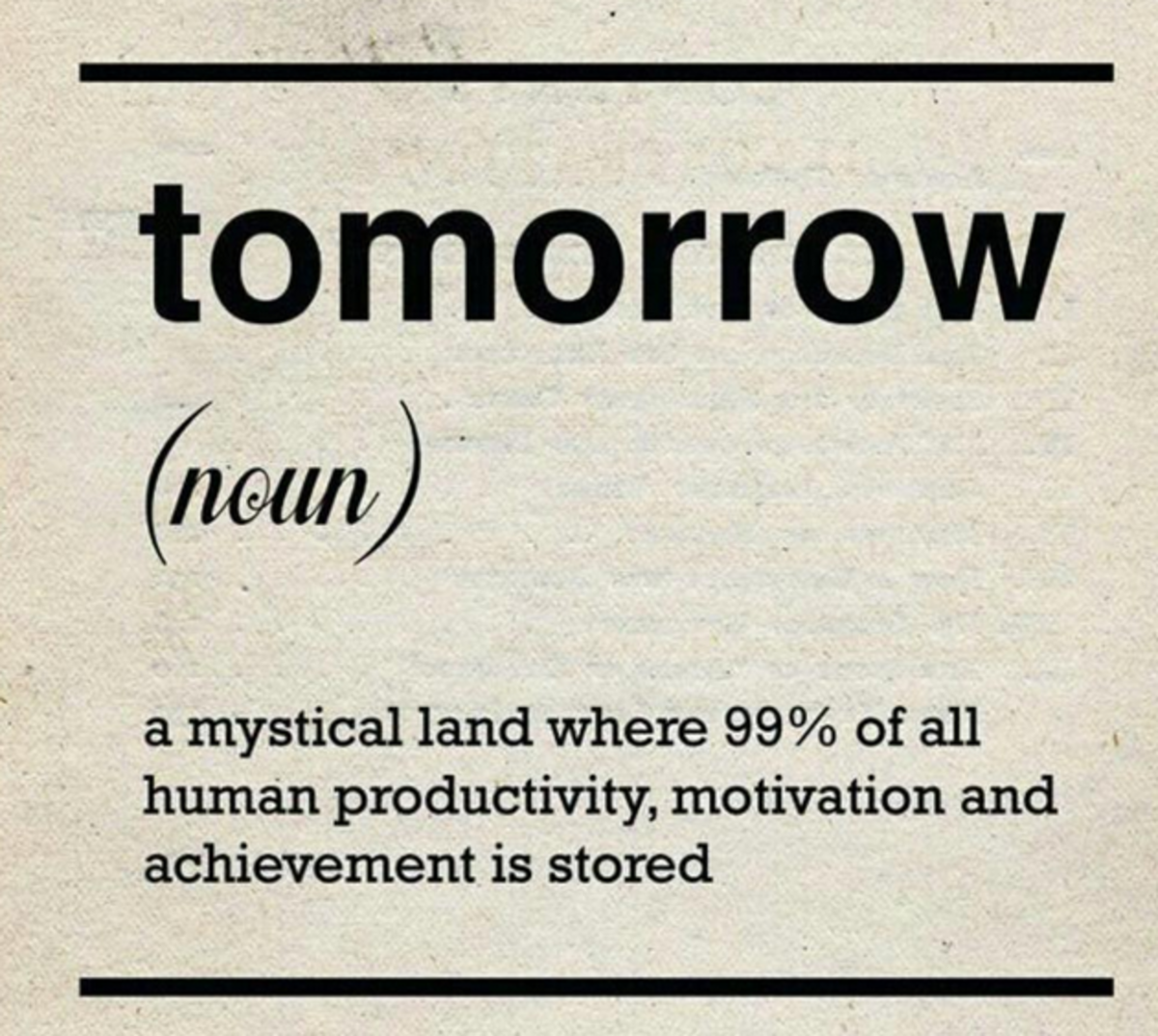Procrastination--how to stop it from ruling your life

TIME is what you make of it.
Copyright© by Jaye Denman. All rights reserved.
“I’ll do it later. I’m just not in the mood today.”
“There’s so much to do, it’s overwhelming! I’ll do something fun today and save the work until tomorrow.”
“You can’t expect me to start a new diet on a weekend! I’ll wait until Monday.”
Most people are occasionally guilty of putting off a chore or project until later, but what if you put off everything until an unspecified “later?” Procrastination is a bad habit, one that gets worse the more you practice it. Too many promises of, “I’ll do it later,” and you’re a serial procrastinator. If you’re always waiting until some other time to do things, chances are you don’t accomplish much of anything.
What causes procrastination?
Why do people delay doing things they know they should go ahead and do? Why are some people more prone to procrastination than others? Let’s look at some of the reasons for procrastination.
~~Perfectionist Procrastinator~~One type of procrastinator is the perfectionist. When the finished product is expected to be perfect, “good enough” results won’t satisfy this individual. The task may be delayed while the person invests too much thought into how to do it to meet unrealistic expectations. Numerous drafts end up in the wastebasket because “…they aren’t good enough.” As the time frame for completing the task becomes smaller, worry sets in, creating another barrier to success and even more delay.
Perfectionists tend to critique their performance before they even get started, with the outcome of inefficiency. Needless to say, the efforts of the Perfectionist Procrastinator rarely meet the standard of “good enough”, much less “perfect.” This mindset creates a huge obstacle.
~~Inadequate Procrastinator~~Another type of procrastinator is the person who feels inadequate to the task at hand or incompetent for the job. This person may be so afraid of failing that he or she is immobilized by fear. It’s scary to contemplate being put to the test if you aren’t sure your skills are good enough to meet expectations. (If you know your skills need brushing up, why wait? Get the training you need now.)
It’s also scary to face the certain failure that occurs from doing nothing at all. While unpleasant to be thought ineffectual, delaying tactics put off more than the task—they postpone the discomfort of living up (or down) to the label of inadequate. Sooner or later, one must face the truth (or the boss). For the Inadequate Procrastinator, that truth will probably be disagreeable.
~~Inertia Procrastinator~~Then, there’s the procrastinator who hates to get started…on anything. The problem may be low energy, inertia or plain laziness. This person is not a self-starter, and if there’s no one to say, “Do it now” and enforce the demand, the starting point of the task keeps being deferred. This type of procrastination reinforces itself. Continuing to avoid a task perpetuates the problem.
It takes more determination and energy to initiate change than to sustain it. The procrastinator demonstrating low energy usually needs direct supervision and to be held accountable.
Seems like the stereotypical teenager with the messy room, doesn’t it? But there are actually adults who function in much the same way on a regular basis. Unless they’re forced into action, they won’t do anything. This kind of procrastination is the result of poor behavioral patterns. Behavioral patterns are learned, so they can be un-learned and redirected. In short, this type of procrastination can be fixed, but only if the Inertia Procrastinator is motivated to do so and has to face consequences if work doesn’t get done.
~~Adrenaline Junkie Procrastinator~~ This is the person who thrives on beating deadlines—often figuratively sliding into base at the last minute. Some journalists and even book authors brag about waiting until their editor is screaming for results before they make a move to do research and write. They’ll say, “I do my best work under the pressure of a deadline.” (Yeah…right! Work produced by last-minute rushing usually looks hurriedly thrown together and often contains errors.)
What the individual who makes that statement actually means is that the editor/boss/client waiting for the results will eventually become angrily insistent for the expected results. At that point, the procrastinator realizes his or her livelihood will be threatened if the work isn’t satisfactorily completed...pronto. Working-by-threat is a bad habit allowed to control this person’s working methods for too long, until it’s become a way of life. The Adrenaline Junkie Procrastinator must either see the need for change, or face the expensive consequences of not meeting deadlines. When the pocketbook is impacted, it usually grabs a person’s attention.
Procrastinators who put off doing their work often let this bad habit creep over into their personal lives. They put off calling family and friends. They postpone paying bills until the utility company turns off the electricity, multiple late payments are owed or they’ve ruined their credit rating. They avoid clearing clutter from their homes while their living abode takes on the paper-stacked-to-the-ceiling look of a hoarder’s house. Taken to extremes, serial procrastinators may even become hoarders.
Unfettered procrastination that is allowed to wreak havoc in a person’s life is like a sickness that must be “cured” if that someone is to break free of its enslavement.
What is the cure?
How can the procrastinator learn to stop putting things off and do everything on time, or even early? It can be done, but, as with changing any bad habit—particularly if it’s long-standing—strong motivation is required, plus practicing good habits to replace the bad ones.

Take the Cure!
~~~~~~~~~~~~
Break the bad habit of procrastination
When trying to change behaviors, it helps to see in writing what is needed. This is when the two-column method can come to the rescue. In the first column, write “advantages of not procrastinating”, and in the second column, write “disadvantages of procrastinating.” Then list everything you can think of that should go in the appropriate columns.
When you write something down, your brain is more likely to remember it. Use a pen and paper, not the computer, for this task, and write in cursive. The act of handwriting programs your brain to store the information in two ways: visually and kinesthetically.
By writing the advantages of new, positive behaviors to eradicate procrastination, you’re, in effect, rehearsing these new behaviors. It’s similar to the way athletes visualize performing a skill so the process actually improves the skill. The brain is an amazing tool! Why not make good use of it?
In the column headed “disadvantages of procrastinating”, be very aware of what you’re thinking when you write and later, reading, this list. Do not allow yourself to make excuses for your bad habit. If you start to make an excuse, challenge it as unrealistic and change it to rational thought. Rational thinking will usually shoot down all of your tired excuses.
For example, you might write: I’m tired after lunch, so I can’t get started on a big task then. This is unrealistic. No one forces you to eat a big carb-laden lunch that will make you sleepy.
Here’s the rational thought: I’ll eat a light lunch of protein and complex carbs that won’t make me lethargic, so I can make a good start on my work this afternoon. If I don’t finish it by the end of the day, I’ll get back to it as soon as possible tomorrow morning.
Another tip: Don’t set yourself up for failure by expecting it. Realize that negative predictions can be self-fulfilling, but so can positive ones. Set realistic goals in writing for completion of your task or project. If you need additional resources, do what is necessary to get them. Then, objective in sight, get started and focus.
The perfectionist should set priorities for all steps of the work, in order of urgency. Self-talk is important. Tell yourself that the work only has to be “good enough” to meet the standard already established. Of course, you should strive to do better, but don't set the bar so high you trip and fall over it. Also, be aware that waiting for inspiration wastes time. Get to work, and perhaps inspiration will strike mid-task. Be prepared to stop yourself from throwing away more than one draft. Hide the wastebasket in a closet, if necessary.
If the thought of a big project overwhelms you, break it down into more manageable parts. Do one part and finish it, then begin on the next. By reducing a huge job into one with multiple smaller parts, you’re able to see yourself reach success, one part at a time. Success breeds success. Soon you’ll have the whole thing completed.
Don’t forget to reward yourself when you avoid procrastination and complete a task on time. Give yourself a verbal pat on the back. Treat yourself to a special cup of tea…something to make you feel good about yourself and your accomplishment. Remember—completed tasks build on themselves. Keep going, and one day you’ll look back at your old procrastination habit and find it hard to believe you ever put things off.
~~~~~~~~~~~~~
Thanks for reading and supporting this HubPages writer!
---------------
Please vote and leave comments. Your feedback is valuable to me.
NOTE: I am the author of this article, and it is owned by me in entirety.It is not available for use by reproducing in any form without my express written permission. If you see all or any part of this article (as written) on another site, please notify me where it can be found. Theft of a writer's work is plagiarism, and stealing another's words is no less wrong than any other theft.
---------------
Don't put it off...do it NOW.









